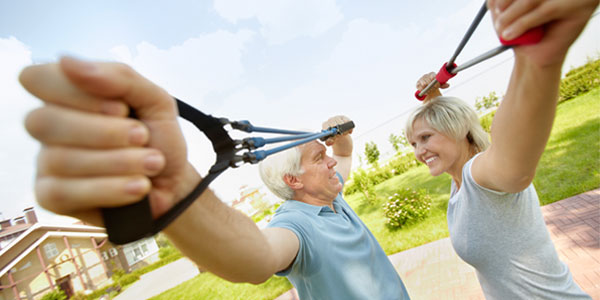Debunking Myths About Exercise and Your Heart
A common tip for improving heart health is to get more exercise. But what form of exercise is best? How much is too much?
Several myths about exercise and the heart have circulated for years. While some may sound reasonable, many are inaccurate and could have a negative impact on your health.
Sutter cardiologist John S. Edelen, M.D., debunks some common myths about exercise and your heart.

Myth: You should avoid exercise after having a heart attack.
Fact: Supervised exercise programs can improve outcomes.
"That's true for the first few weeks, but all the studies show that supervised exercise – especially in a cardiac rehab program – are associated with improved outcomes for most patients," Dr. Edelen says.
Patients should speak to their doctor before starting an exercise program after having a heart attack.
Myth: You shouldn’t exercise if you have heart failure.
Fact: Being sedentary causes more damage to your health.
"That used to be what was thought, but it turns out in patients with mild to moderate heart failure, half of their shortness of breath is often due to being sedentary and physically deconditioned," Dr. Edelen says. "Their shortness of breath can often be improved with a gradual increase in regular exercise, another role for cardiac rehabilitation programs."
Exercise benefits everyone, even people with heart and blood vessel diseases. Aerobic exercise in particular can improve circulation, reduce heart disease factors, and strengthen the heart and cardiovascular system.
Myth: You have to exercise a lot if you want a healthy heart.
Fact: Going from sedentary to some exercise will keep your heart healthy.
"No, you have to exercise a little – but make sure it's age-appropriate exercise," Dr. Edelen says. "Two studies released in 2015 show the biggest improvement in mortality for everyone is going for that daily walk. For a healthy heart, the most benefit comes in the first 20 minutes of exercise and there are incremental benefits up to 150 minutes per week. But, the biggest benefit comes from getting off the couch and going for a daily walk. Getting active is more important than becoming an athlete."
Myth: Too much exercise can damage your heart.
Fact: Endurance athletes (such as marathon runners) that do extreme training and competing for years may have higher rates of heart problems.
Sedentary people who suddenly do very vigorous exercise are much more likely to have a cardiac event than people who have slowly increased their endurance and do moderate exercise, Dr. Edelen notes.
Don't perform vigorous exercise seven days a week, and take days off to give your muscles time to recover.
Myth: Your maximum heart rate is 220 minus your age.
Fact: This number varies by individual.
"That is true on average, but there is very wide individual variation," Dr. Edelen says. "For example, max heart rate decreases by 10 for each decade of age."
For aerobic exercise such as jogging or biking, your target rate is 70 to 85% of your maximum heart rate – just below the anaerobic threshold. You should still be able to carry on a conversation while exercising without panting.
Myth: If you want to lose fat, you have to keep your heart rate in the “fat-burning zone.”
Fact: You do not burn fat exercising at a higher heart rate.
"No – if you exercise at a higher heart rate, you're going to have to quit sooner," Dr. Edelen says. "If you exercise longer, you will burn more calories. You never really burn fat, you burn calories. On machines in gyms, there are fat-burning programs but I'm not sure of the science of where they come from. It targets a lower heart rate than anaerobic exercise, so the idea is if your heart rate is lower, you can exercise longer and more calories are burned due to that."
Myth: Heart rate monitors on exercise machines are accurate.
Fact: Unless they are being calibrated for accuracy daily, they probably aren't.
"A lot of heart rate monitors don't work at all, and gyms are too busy to calibrate them," Dr. Edelen says. "When the machines are new they may be accurate, but as they get older they become less accurate."
Myth: Heart disease only happens to people who don’t exercise.
Fact: Being sedentary is only one of many cardiovascular disease risk factors.
"So many factors contribute to coronary artery and vascular disease: smoking, high blood pressure, diabetes, high cholesterol, sleep apnea, high-fat and high-sugar diets, obesity and genetics," Dr. Edelen says. "Lifestyle does make a big difference, but it's not just exercise. The more 'less good' choices you make, the more risk you have of developing heart disease."
Discover Similar Stories
Choose a topic below to read more stories like this one.





